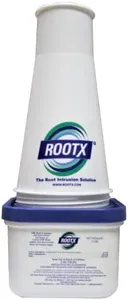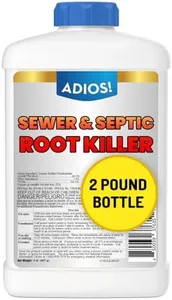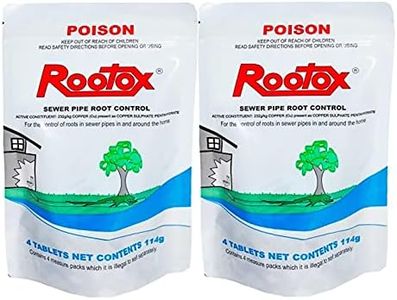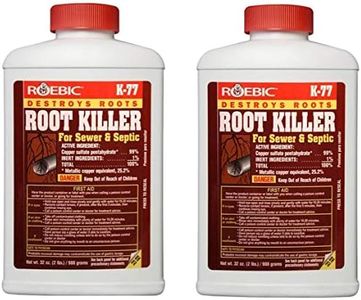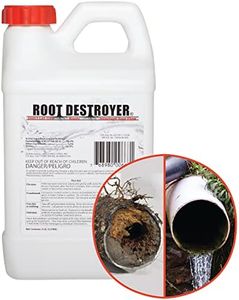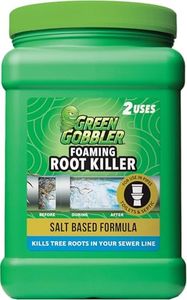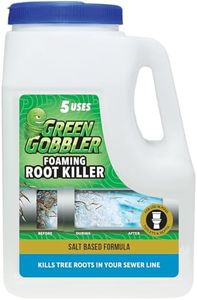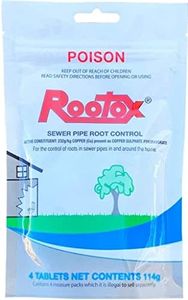We Use CookiesWe use cookies to enhance the security, performance,
functionality and for analytical and promotional activities. By continuing to browse this site you
are agreeing to our privacy policy
8 Best Root Killer For Sewer Lines
From leading brands and best sellers available on the web.Buying Guide for the Best Root Killer For Sewer Lines
Choosing the right root killer for your sewer lines is important to maintain the health and longevity of your plumbing system. Roots from trees and other plants can invade pipes, causing clogs and potential damage. With so many options available, it's helpful to understand what attributes to look for in a root killer so you can make an informed decision based on the severity of your issue, your plumbing setup, and your environmental considerations. Start by identifying the scale of your problem—whether you're dealing with a small nuisance or a major blockage—and consider how quickly you want results and how involved you want to be in the application process.Type of Root KillerRoot killers are generally classified as chemical (like copper sulfate or foaming agents) or natural/enzyme-based products. Chemical root killers work by poisoning or dehydrating the roots, while natural options use enzymes and bacteria to break them down more gently. Chemical types may act faster and are often used for more severe blockages, but can be harsh on pipes and the environment if not used as directed. Enzyme-based products are a safer choice for regular maintenance and are less likely to damage your pipes or harm local ecosystems. Choose a chemical root killer if you have a major, recurring root issue and need a powerful solution, but opt for an enzyme-based product if you prefer a gentler approach or are using it as a preventative measure.
Application MethodRoot killers are available in forms like powders, liquids, or foaming solutions. Granules and powders are usually flushed down the toilet, while liquids and foams can be poured directly into the drain or a cleanout. Foaming agents are unique because they expand to coat the entire pipe interior, making them especially effective for larger areas or pipes with severe root intrusion. Powders and liquids may only treat the bottom of the pipe. Decide on the application method by considering the accessibility of your pipes and whether you want an easy, quick dump-and-flush process or a more thorough treatment.
Action TimeThis refers to how quickly the product works to eliminate roots. Some root killers offer almost immediate results, helping clear minor blockages within hours or days, while others are gradual and better suited for long-term maintenance. Fast-acting products are great if you're experiencing a backup and need quick relief, but can sometimes be harsher. Slower-acting options may take weeks but can be safer for routine treatment and ongoing prevention. Assess the urgency of your situation: if you need a swift fix, opt for a quick-acting formula, but if you're planning for long-term root control, a slower, maintenance-focused solution can be ideal.
Compatibility with PipesNot all root killers are safe for every type of pipe. Some can be corrosive to metal or old clay pipes, whereas others are formulated to protect all types of plumbing. Make sure to check if the root killer is specifically labeled as safe for your existing sewer pipe material (e.g., PVC, cast iron, clay tile). If you're unsure of what kind of pipes you have, choose a product with broad compatibility or consult a plumber to avoid accidental damage.
Environmental ImpactCertain chemical root killers can have a negative impact on the surrounding soil, groundwater, and beneficial microbes within your septic system. Environmentally friendly or biodegradable root killers are designed to minimize these risks. If you are concerned about pollution or have a septic system, pick a root killer that is marked as septic-safe or environmentally friendly. Consider your local regulations and environmental goals to guide your decision.
